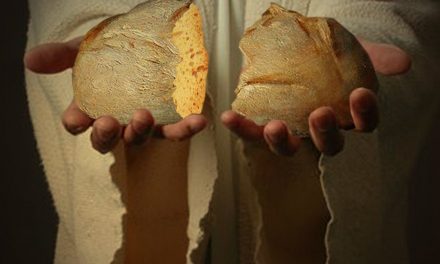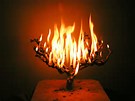First Reading – 2 Samuel 7:1-5, 8b-12, 14a, 16
Responsorial Psalm – Psalm 89:2-3, 4-5, 27, 29
Second Reading – Romans 16:25-27
Traditionally, the fourth candle on the Advent wreath, which we can (finally!) light this Sunday, symbolizes love. Also called the “Angel’s Candle,” this final purple candle calls attention to the messenger who appears to Mary in the Gospel and reminds us that God’s love is the reason for the Incarnation.
The readings for this Fourth Sunday of Advent help us see why it is so important to remember that God’s love is the animating force behind the gift of Christ we are preparing to celebrate on Christmas.
The first reading and the responsorial psalm both emphasize the way God’s love for the chosen people of Israel lays the foundation for the divine intervention that ultimately effects our salvation. Specifically, they show the depth of God’s promise to God’s people.
In the first reading, King David promises to build God a house, but God intervenes and insists that God does not need humans to create a divine home. Instead, God promises to “fix a place for my people Israel,” and to “establish a house for you.” This, significantly, includes a guarantee to “raise up your heir after you…and make his kingdom firm. I will be a father to him, and he shall be a son to me.” Here is the David promise of a Messiah, sprung from the house of David, who will rule over all. The words of this Sunday’s psalm praise these promises and underscore the grace received through God’s guarantees.
There is a fascinating reversal of expectations involved in these readings. King David wants to build God a physical house—a literal dwelling place—and God promises to build David a house of a different kind—a family (à la “Fall of the House of Usher”). In some ways, this foreshadows the way that God will ultimately fulfill this promise, which is similarly by reversing expectations. God’s people take this promise literally and expect the Messiah to look and act much like David, ruling over all on this earth, but when the Messiah comes, it is as a lowly, suffering servant, seemingly as un-kinglike as possible (see the Catechism of the Catholic Church’s discussion of Jesus’s title as “Christ,” or anointed one).
The reversal of expectations is apparent also in the Gospel reading. The angel appears to Mary and announces that she will bear the “Son of the Most High,” who will fulfill God’s promise to ensure the perseverance of the throne of David. Mary is astonished by this pronouncement, but nevertheless puts her faith in God and assents, “May it be done to me according to your word.”
I am always fascinated by this part of the mystery of the Incarnation, which is accentuated by the pairing of this Gospel reading with this week’s first reading. David wants to build God a house and envisions a great temple; God insists that it is not humanity’s responsibility to build this house and then, ultimately, builds a “house” for God’s presence in human flesh. This is what it means for Catholics to reflect on Mary as “a living tabernacle,” for she literally housed God in ways David’s vision for a house for God could never have imagined.
Here is the heart of the “gospel and the proclamation of Jesus Christ” that St. Paul insists in the second reading “can strengthen” us: God fulfills God’s promises but in ways that are far more impactful than we could ever imagine.
As we wait in hopeful anticipation of Christmas, let us remember this history and be prepared to look for God not just in the “obvious” places, but also in the mundane realities of our daily lives. I love the Ignatian Examen as a tool for this process, but there are many ways to be more attentive to the work of God in our lives. The thing we learn from Advent is the assurance that God comes to us, we just need to be prepare to see this “advent” (coming) on God’s terms rather than ours.





